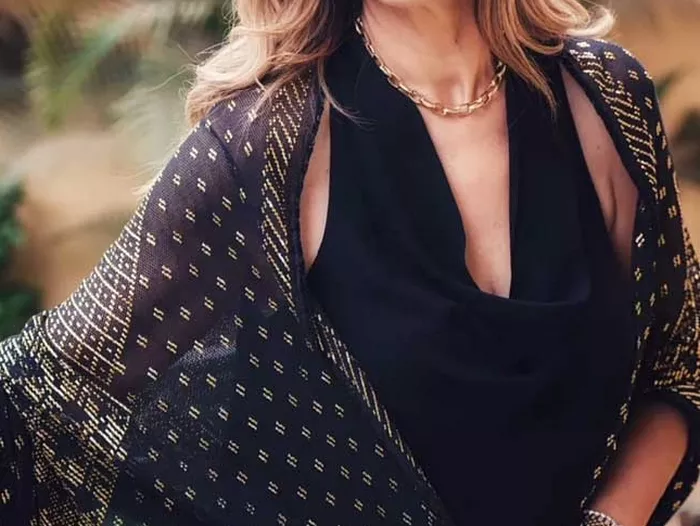El-Messiry, Foda, and Ali have seamlessly blended modern, comfortable, and stylish outfits with a deep respect for Egyptian heritage, using dresses as vehicles for expressing feminism and femininity. Their work bridges the gap between Egypt’s rich past and present, and connects the country’s south to its north. Through their fashion ventures, they have reimagined the styles, motifs, and designs of Egyptian women, drawing inspiration from places like Upper Egypt, Siwa, Ancient Egypt, and Coptic Egypt.
The essence of their creations is aligned with pioneers like Suzanne El-Masry, Azza Fahmi, and Shahira Mehrez—celebrating Egyptian identity in a unique and impactful way.
“For me, it’s all about Egyptian identity—not only in fashion but also in home décor, pottery, towels, and scents,” said El-Messiry, who has spent nearly 30 years creating dresses, bed linens, curtains, and lighting inspired by Egypt’s rich cultural heritage. “Whether it’s Nubia, the Delta, Coptic Egypt, or beyond, I seek inspiration and bring together the various elements of our identity,” she added.
With over a decade of experience in Egypt and internationally, El-Messiry has built her reputation on “modernizing heritage,” often in an eclectic way. Her Ramadan table spreads, blending Islamic and Pharaonic designs, and her loose-fitting dresses adorned with motifs from multiple historical periods reflect this vision. “I believe it’s crucial not to let our identity fade, and fashion is a unique way to document history,” she explained.
El-Messiry invests significant time in research for each collection, a task she thoroughly enjoys, and also focuses on skilled craftsmanship—something increasingly rare to find. Her commitment to quality and use of premium materials ensures the preservation of heritage through her creations. “Investing in training skilled workers is worthwhile,” she said.
She credits her success to her dedication to quality control, stating, “Every step counts—designing, ensuring authenticity, sourcing the right fabrics and colours, securing inscriptions and prints, and perfecting the finishing touches.”
Hala Foda, the founder of Tallyna—an initiative aimed at reviving Upper Egypt’s traditional tally stitching—also faces the challenge of sourcing skilled artisans for producing high-quality, heritage-inspired fashion. “Each design is intended to highlight Egyptian heritage and the artisans’ talent, while also appealing to the modern Egyptian woman’s style—a task that is neither easy nor cheap,” she said.
Like El-Messiry, Foda is pragmatic about budgeting for production and pricing for sales, recognizing that creating high-quality, branded pieces requires considerable financial investment, particularly when it comes to fair wages for artisans.
“We create modern outfits—dresses, trousers, and loose shirts—using tally stitching. But if the stitching is clumsy, we must discard the piece,” she explained. Foda is committed to offering competitive wages to retain skilled artisans and ensure the continuity of her craft. “It’s a demanding task, and if people don’t see the value, they naturally seek other work,” she added.
Tally is a traditional embroidery technique from Upper Egypt that uses metal-threaded needles to weave materials like nickel, silver, copper, or brass onto netted cotton or linen fabric. Historically, specific designs and fabrics were reserved for special occasions, such as weddings. By the mid-20th century, however, tally embroidery began to fade in popularity.
Foda credits a 1990 UNESCO initiative with helping revive the craft by training young women in Upper Egypt. “A key part of preserving heritage is merging it with contemporary fashion,” she said. This philosophy led her to develop Tallyna through trial and error before launching collections and offering custom-made items.
Each design created by Foda is named in honor of one of the women who played a pivotal role in bringing her project to life. “I did the research, but I couldn’t have done this without them,” she said. True to its name, Tallyna means “Our Tally.”
Amani Ali, the founder and manager of Nawara—a fashion brand inspired by Siwan heritage—believes that folk knowledge and the dedication of community women are essential to any heritage-modernity fusion project. “Older generations, who have spent years crafting outfits for themselves and their families, possess invaluable knowledge of Siwan fashion,” she said.
Ali’s journey began when she became enchanted by Siwan designs and jewelry while working in an eco-hotel in Siwa. “I wanted to share this beauty with a wider audience,” she said.
When Ali launched Nawara, she discovered that younger women in the region were less familiar with traditional embroidery techniques than their elders. “I realized that unless they became interested and skilled, this art would vanish—especially with the rise of ultra-Salafi ideologies that regard Siwan attire as immodest due to its vibrant colours,” she explained.
At the time, much of the craft was already disappearing. “It’s labour-intensive and expensive to embroider every dress so intricately,” she noted. Without a structured initiative—such as Nawara—even on a small scale, there would be little incentive for younger women to continue the tradition. Ali has encouraged participation by offering fair wages and enabling women to work from home, allowing them to manage their households while earning a living.
Like Tallyna, Nawara primarily operates through social media. “I ensure steady production but don’t follow a collection-based model—once a piece is ready, it goes up for sale online,” she said. Nawara also takes custom orders.
Similar to El-Messiry and Foda, Ali acknowledges that the economic realities of heritage fashion mean that many of her pieces are bought by foreign customers who can afford the price tags.
None of the three women initially studied folk art or fashion design—El-Messiry and Foda both have backgrounds in French literature, while Ali studied English literature. Each of them took it upon themselves to master their craft. Today, they take pride in creating brands that leave a lasting mark at home and resonate globally.
Related Topics
- Belly Pudge Dress Trend Empowers Women to Embrace Their Natural Bodies
- Dior Celebrates Femininity with Stunning Fall/Winter 2025 Collection at Paris Fashion Week
- Toju Foyeh’s JEMIMA Collection Redefines Bridal Fashion for Empowered Black Women

